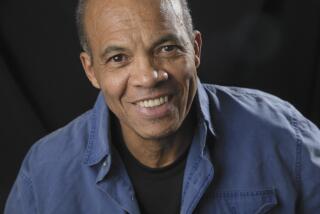Meat in the Tiger’s Mouth : BUFFALO AFTERNOON <i> by Susan Fromberg Schaeffer (Alfred A. Knopf: $19.95; 535 pp.; 0-394-57178-9) </i>
“Buffalo Afternoon” is an epic-sized novel of the Vietnam War built around the life of Pete Bravado, a confused teen-ager who enlists to fight that war and returns to America an angry veteran. Back home, Bravado is tortured by guilt and memories and by his fellow citizens who taunt him for fighting a war they find incomprehensible.
Susan Fromberg Schaeffer interposes Bravado’s story with that of a Vietnamese woman whom he meets during the war; the book opens with her life in a timeless Vietnamese village where, as a young girl, she passes innocent “buffalo afternoons” with her beast. American GIs mindlessly gun down this buffalo in the battlefield equivalent of a joyride and set the mood for this young girl’s fall into prostitution and Schaeffer’s interpretation of the Vietnam War.
In film and fiction, the teen-age GI’s bewildering odyssey through Vietnam’s battlefields has become the vehicle of choice for expressing anger at the war. Stanley Kubrick’s “Full Metal Jacket” is a recent cinematic example. A subject nearly as popular is that GI when he returns and becomes the troubled veteran lost in his own culture, stupefied by his compatriots’ disregard for all he suffered in the line of duty. Bobbie Ann Mason’s “In Country” is peopled with such veterans.
Schaeffer has joined these two genres in “Buffalo Afternoon,” a novel of 535 pages that, unfortunately, demonstrates why neither the young soldier nor angry veteran can explain the war or heal its wounds. She tells Bravado’s story as if documents such as “The Pentagon Papers” did not exist; as if Gen. William C. Westmoreland had not written “A Soldier Reports” to give his side of the story; as if there were no way to get at the answers behind the war.
“Buffalo Afternoon,” instead, uses the Vietnam War as a backdrop for madness. Schaeffer is extremely gifted at portraying madness. Her battle scenes, Bravado’s drift into madness when he tries to forget the war rings true.
But Schaeffer becomes trapped by her own talents. To keep up the theme of madness, she ignores the full history. She rarely shifts her vision above or beyond the eyes of Bravado--from his mean-spirited, lower middle-class community in Brooklyn to his soldier/tourist view of Vietnam. Her Vietnamese characters are stereotypes that deny any serious intent behind that country’s war. All we meet are Vietnamese soldiers on both sides who commit atrocities with ease; innocent villagers who fail at their main occupation of keeping out of war’s way, and the requisite black marketeers and prostitutes.
Li, the prostitute whose story opens the book, is the one Vietnamese allowed a full voice. She represents the ideal vision of village life destroyed by war; neither she nor any other Vietnamese is allowed to explain the basis of their war, the conflict between nationalism, Communist revolution and foreign intervention. Instead, she is the Vietnamese counterpart of Bravado, another victim of mindless slaughter.
The murder of her buffalo convinces Li she is without a soul and, so cursed, she becomes a prostitute. Bravado meets her in a whorehouse; she becomes attached to him thinking he, too, has lost his soul. Pregnant, she joins up with Bravado’s unit where she becomes an unofficial guide and gives birth in the field to a little girl.
This newborn infant is passed around by the admiring GIs until a South Vietnamese soldier puts her in his arms. He takes the child away and “dashed it head first against the ground. The fragile skull split open like a melon. . . .”
Bravado breaks the neck of this soldier with his bare hands. Li disappears. The central crimes of the novel are committed.
Bravado leaves Vietnam soon after. “The whole damn thing doesn’t mean anything,” he has decided. “It doesn’t add up to one life lost here.”
His alter-ego, another Italian-American named Sal, agrees. “It means Li was right. Remember? She used to say, ‘Don’t bring meat to the tiger’s mouth’? We’re the meat. They brought us to the tiger.”
The political analysis does not rise above this sentiment. Who are ‘they’? Who is the ‘tiger’? Is this a novel against all wars, or simply against Vietnam?
Back home, demonstrators scream at veterans that the United States should never have become involved in another nation’s civil war. A well-meaning, upper middle-class night school teacher humiliates Bravado by lecturing him and his classmates about the war and how the United States sent “good men over there and they end up mass murderers. . . . Never again will we be able to think of ourselves as the best country on earth. . . . Now we’re all war criminals. By proxy.”
Is the teacher right or wrong or representing a composite of half-baked judgments?
Bravado gets it from all sides. A right-wing cop tries to shoot him and a buddy in a bar fight over Vietnam. His wife resents his Vietnam-related maladies and leaves him after he tries to strangle her. He admits himself into a Veterans Administration hospital where his psychiatric treatment consists of heavy sedation. He burns his ex-wife’s car. He hides, naked, in the bushes next to his old parish church when it rains. He has trouble holding down jobs. He nearly dies of complications from what seems to be Agent Orange but his doctor is afraid to admit this.
Bravado’s epiphany begins when his parish priest hears his confession and then makes sure he knows about a homecoming parade for Vietnam veterans. At another parade, in Chicago, Bravado is reunited with Sal who convinces him to start therapy with an Asian-American doctor who is herself the child of survivors. He finally meets a woman he can love, another veteran, and at the Vietnam Veterans Memorial in Washington he finds “more strength to remember.”
On the last page, he and Sal decide: “It’s buffalo afternoon for us, man. We’re going to make it. It’s the peaceful time. It’s time to wander the fields and bring it all back home.”
Vietnam as madness has become a dangerous cliche. Vietnam was a particular war, fought for particular reasons that explain what Schaeffer fails to explain in her book--why those homecoming parades were “fifteen years too late,” why the veterans had to organize their own war memorial, why the doctor won’t diagnose Agent Orange complications.
Unless novelists and film producers attempt to provide such answers, they irresponsibly play on our natural sympathy for the victim without telling us who or what caused the war. Even fiction requires cause and effect, otherwise there is no larger truth to be gleaned. And Americans will continue to dodge the question: Why Vietnam?
More to Read
Sign up for our Book Club newsletter
Get the latest news, events and more from the Los Angeles Times Book Club, and help us get L.A. reading and talking.
You may occasionally receive promotional content from the Los Angeles Times.






